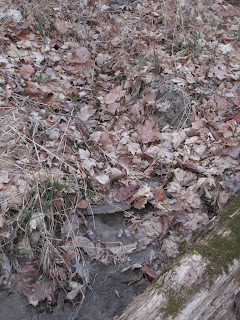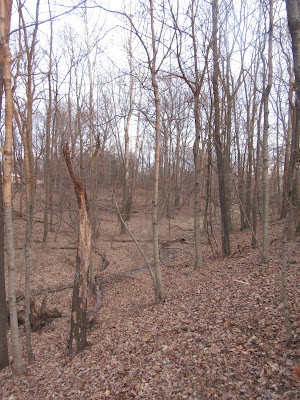Winter's Progression #6
The Shape of Things to
Come
February 2018
February 4
February 6
February 11
February 13
February 20
February!
Th last month that is
truly, 100 percent winter. I love winter and miss it after it passes.
But, I am also looking forward to the excitement of spring when new
things happen with increasingly rapid frequency.
February did bring some
very early signs of spring:
Swelling tree buds ….
February 20
moss and lichen waking
up …
February 6
February 13
February 20: Moss with sporophylls, near the Inlet
the first tiny
seedling plants peeking through leaf litter …
February 13
some insects daring to
show up and fly about …
February 20 - A collapsed spider web full of gnats
flocks of Snow Geese
flying over the woods, one after another …
February 6
and the critchety
calls of Chorus Frogs!
Early February was cold,
with a dusting of snow that visually brought out areas of dampness
and water flow.
February 4: A pale ribbon through the bottom of the woods shows the path of the Creek
February 4: Cottonwood Pond and the area (to the right) that drains into it
February 6: Seep area (which starts at the pond corner) draining into the Creek at the Very Rotten Log
February 6: Main pond (bottom right) with Isthmus to its upper left
February 6: Temporary Creek #1 (distance) emptying into the Swampy Spot (foreground)
February 6: Light snow concentrations show location of Swampy Spot
February 6: Water flows from the Swampy Spot (upper right) down to the Inlet and into the main pond
A thin layer of ice
developed over the Creek and pools, showing previous water movement
through illustrative, beautiful designs.
February 4: The rising sun glistens off of the Creek ice
February 6
February 6: Ice on the Creek
February 6: Creek
February 6: Main pond
February 6: Main pond at north end near Isthmus
February 6
February 6: "little pond"
February 6: "little pond"
In mid-February, ice and
snow were gone, and all was brown again.
February 11
February 13: Cottonwood Pond area as seen from the northwest
February 13: Creek winding through woodland northwest of Cottonwood Pond, not far from Temporary Creek #2
By February 20 there were
distinct changes. Previous rains had left signs of their effects on
the area – where water had collected, flowed, and pushed through.
But, the rains had been far enough behind to allow pools to become
calm, clear, and reflective.
February 6: Frozen crawdad chimney
February 20: Soggy crawdad chimney
February 6: Where the Seep meets the Creek - the Bark Ledge barely visible
February 20 - Bark Ledge more visible, with water flowing under it into the Creek
February 20: Creek flowing through woods bottom - a tributary meets up with it from the east
February 20: Creek flowing under the Barkless Log near Cottonwood Pond
February 20
February 20: Water in the main pond
February 20: Cottonwood Pond and the Inlet
February 20: closer to the Inlet
February 20: Other side of Inlet, where water flows into the pond
February 20: flow path from Swampy Spot to Inlet (left)
February 20: Swampy Spot
February 20: Temporary Creek #1, which flows into the Swampy Spot
February 20: north corner of Cottonwood Pond, and the Isthmus (upper center)
The most significant
difference showing on February 20 was at the Mud Pile. There had been
fresh, strong dropping of soil from the Root Ball to the Mud Pile below.
Root Ball and Mud Pile, showing the Cove opening between
Debris on the Scree/Mud Pile: broken-of pieces of roots from the Root Ball make their way down to the water
The north edge of the Root Ball has been greatly reduced over time as soil has fallen from the old roots
Over time, as soil has
fallen from the Root Ball and considerably enlarged the Mud Pile, the
main pond has become more crescent-shaped and shallower.
The Root Ball, the Mud Pile and the main pond seen from the north/northwest (at the Isthmus)
But, during rains and snow
melts the water has continued to fill the depression that I call
Cottonwood Pond. As water pours down the slopes into Temporary Creek
#1, then into the Swampy Spot, then through the Inlet (which has
enlarged over the years), it has to go somewhere.
Will water push at the
outer edge of the pond, eroding it and overflowing the banks? Will it
deepen what has been the shallow rim? Will the pond continue to
exist, but further from the Root Ball and Mud Pile, and perhaps in a
different shape?
There is one thing I do
know at this point, in February: the Chorus Frogs still find this
place amenable.
February 6
February 20: "little pond" seen from the north/northeast


























































No comments:
Post a Comment